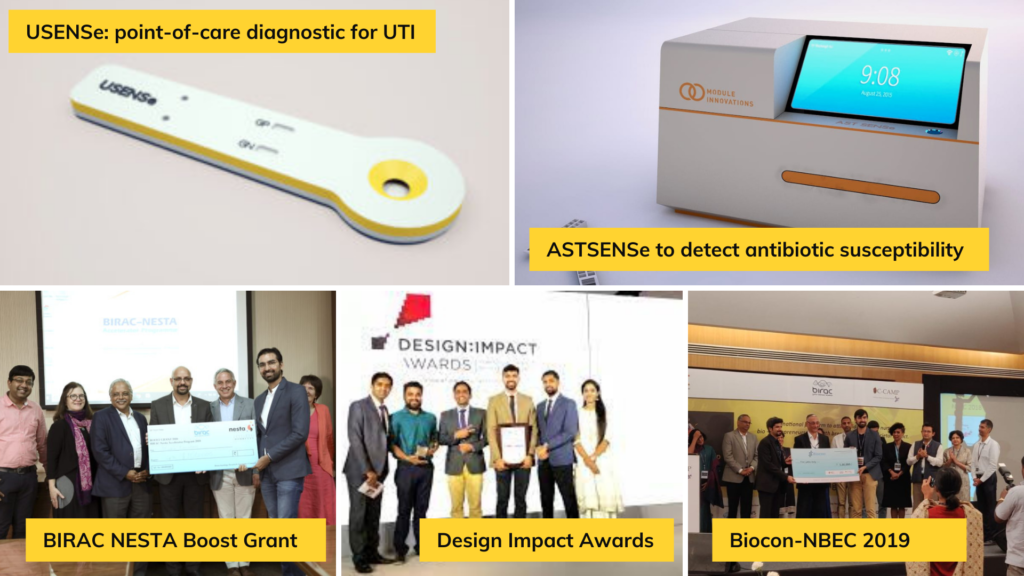
In conversation with Sachin Dubey, Co-founder of Module Innovations:
What’s your backstory and how did you come up with the idea?
I was sure that I wanted to become an entrepreneur, but I didn’t see any clear way forward. It was during an internship at CSIR-NCL that I saw an opportunity. I was working on a technology that detected bacteria responsible for urinary tract infections (UTIs). This technology had immense commercial potential, but my supervisor at NCL was retiring and didn’t want to take on the challenges of a startup. Venture Center’s Lab2Mkt program provided the perfect opportunity and support system to take an NCL technology to market, despite not being formally associated with the institute.
At the same time, my sister-in-law, who was pregnant, got UTI. That was the time we realized that the detection of UTI bacteria takes two days. Despite many technological advances, the culture test takes long time. So I wondered if we could develop something that could get us rapid results and we could start the treatment quickly.
Tell us more about the technology.
Urinary tract infections are the second highest infections in humans and cause for prescribing an antibiotic. It is also one of the leading contributing factors to the increasing threat of drug resistance, as conventional urine culture reports can take up to 48 hours, and patients are usually prescribed broad spectrum antibiotics.
Our technology USENSe is a single use point-of-care diagnostic which accurately detects the presence of UTI-causing pathogens in less than 15 minutes. During India Innovation Growth Program 2.0 (2017), Dr. Himesh Gandhi, a leading urologist from Ruby Hall Clinic in Pune pointed out that while a diagnostic device like U-Sense was appreciable, for treatment, it would help to know what antibiotic the particular bacterium was sensitive to.
Currently, the culture method takes 48 hours to determine antibiotic sensitivity, Hence we also have developed a nanotech-based rapid point-of-care diagnostic to not only accurately detect UTIs but also identify the pathogen causing the infection, all within 2 hours and 30 minutes. This is our flagship product ASTSense which is the world’s first 2 hour phenotype test to detect antibiotic susceptibility of UTI uropathogens – truly groundbreaking!
What is the impact of your work?
Globally, there are 150 million reported cases of UTIs every year, and it is believed that half of all women will contract UTI once in their lifetime. Untreated UTI increases the risk of sepsis, kidney damage, and other health-complications.
We envisage that our products can have impact at multiple levels. There are so many women in rural areas who silently suffer from UTI as there is no way they can detect the infection owing to the lack of trained manpower and suitably equipped pathology labs. There are currently close to 40,000 primary health centers across India, and USENSe can be the point-of-care diagnostic that staff at these PHCs can use to atleast confirm whether there is a uropathogen and whether it is gram positive or negative, thus helping them prescribe at least a gram-specific antibiotic.
Another possible application of USENSE is to eliminate needless antibiotics at a B2C level. In a worrying statistic, in up to 30% of “suspected UTI” cases, the culture report is negative and does not reveal the presence of a uropathogen. In many cases, specially when babies and children develop fever, doctors are quick to suspect a UTI and prescribe antibiotics, not wishing to wait for culture reports that can take up to 72 hours. In such scenarios, an over-the-counter UTI diagnostic strip can help a person make an informed decision on whether a uropathogen is present in the first place and whether it makes sense to start an antibiotic course.

Our product ASTSENSe can help with controlling antimicrobial resistance at a hospital level. For patients who are admitted to the hospital or for patients who suffer from recurring UTIs owing to a resistant pathogen, this technology can help doctors with faster decision making on the specific antibiotic to be recommended. Traditionally, results for antibiotic sensitivity can take up to 72 hours, and with ASTSENSe, we are cutting down that time by 95% to within 2-4 hours.
My goal is not only to promote ‘Make in India’, but to go a step beyond and have products which are ‘Made in India, for the World’, and with USENSe and ASTSENSe, we believe it is possible to have an impact on a global scale.
How was Module’s journey funded?
Fellowships and Grants
- CARB-X funding – the first Indian diagnostics company to be funded by CARB-X, and the second Indian biotech company to receive support from CARB-X
- BIRAC Biotechnology Ignition Grant
- BIRAC SBIRI
- Tata Trusts – Design Impact Award
- Grand Challenges Canada
- BIRAC NESTA Boost Grant
Awards
- NESTA Discovery Award for pioneering work in AMR
- Biocon NBEC 2019
Equity
- NSTEDB – Seed Support System (hosted by Venture Center)
What do you think were the key reasons for the success of Module Innovations?
After successfully raising funding from CARB-X, the committee told me that they liked my technology and business idea, but they absolutely loved my presentation and story. Hence I believe that being able to tell a good story about your journey and your start-up is a critical factor. This shows your drive to your employees, customers, investors.
Another key factor is being able to work within tight deadlines and endure hardship without losing your morale. For example, even with great funding offers such as CARB-X, finding a matching fund within the tight deadline was not easy as most offers came at very low valuations. Finally, keep an eye out for any and all opportunities as they can come knocking from anywhere. So be ready!
